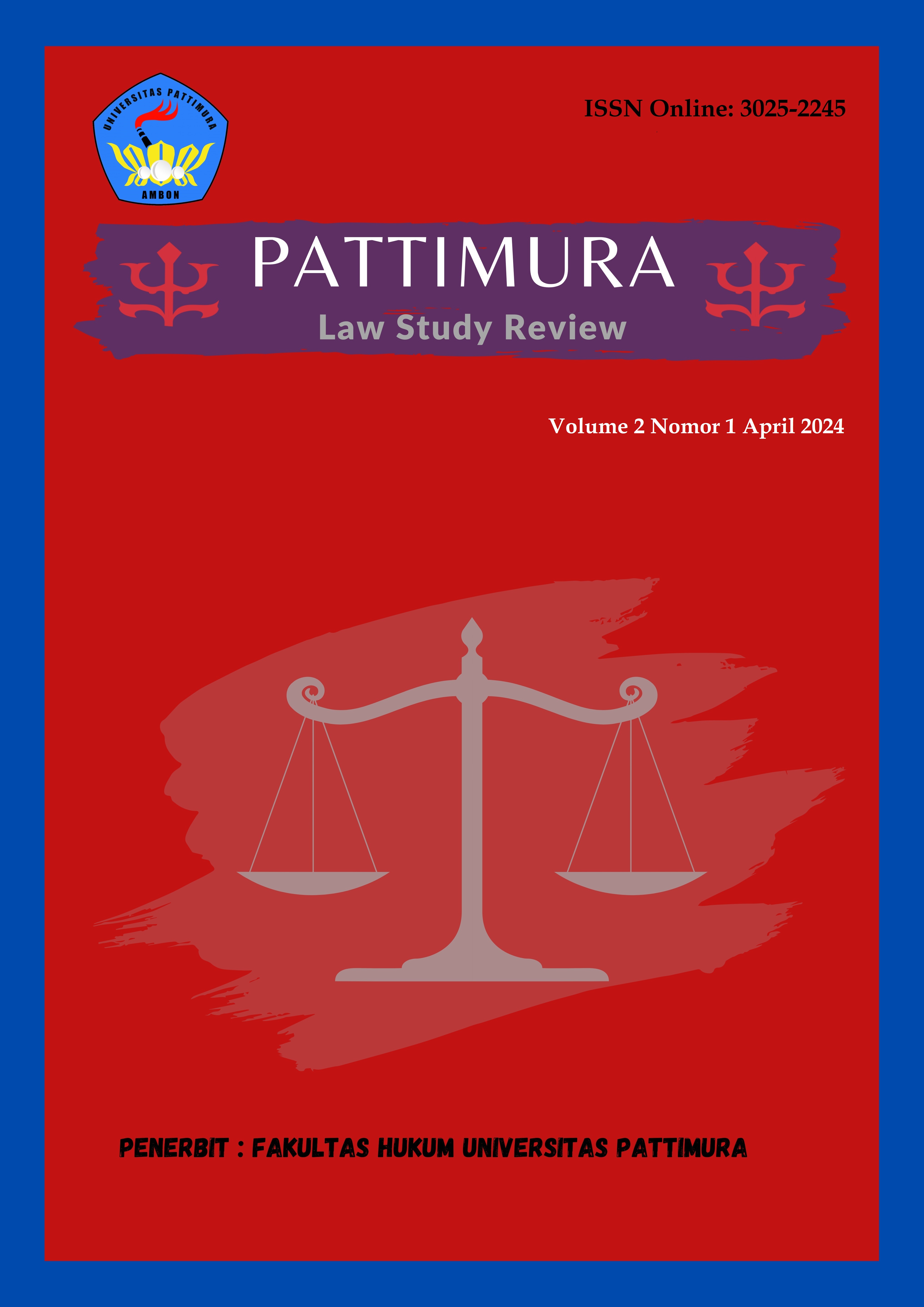Penerapan Diversi Oleh Hakim Dalam Penyelesaian Perkara Pidana Anak Ditingkat Pengadilan (Studi Pengadilan Negeri Masohi)
Abstract
ABSTRACT: Diversion is the resolution of a child's case from a criminal process to a process outside of criminal law. Because children have rights to be protected, the handling of children's cases and adult cases is certainly different. Diversion can be carried out at every level, starting from investigation, investigation and even court level. With the existence of a diversion system, it is hoped that there will be legal reform in children's cases so that the diversion process is carried out to prevent children from being labeled as criminals and to prevent children from being negatively impacted by the prosecution process. Purposes of the research to find out the application of restorative justice in the diversion process in court as well as the mechanism for implementing diversion by judges in resolving criminal cases at court level. The research method in this research is normative juridical. The problem approaches used are the statutory approach, conceptual approach and case approach. The results of this research show that in carrying out the diversion process in court the judge has the right to determine which children's cases can be attempted diversion and in its implementation the judge must also seek diversion through the mechanisms that have been regulated. In children's cases with determination Number 2/Pen.Div/2023/PN Msh Jo. Number 3/Pid-Sus-Anak/2023/PN The judge has attempted diversion in accordance with the diversion implementation guidelines mechanism in PERMA No.4/2014, so that the diversion efforts carried out in the child's case at court level can be successful.
Downloads
References
Jurnal
Astuti Nur Fadillah, Anna Maria Salamor dan Patrick Corputty, Penyuluhan Hukum Perlindungan Anak Pada Lembaga Kesejahteraan Sosial Anak (LKSA) Ittaqollah Kota Ambon, Jurnal Pengabdian Hukum Vol 1 No 2 Tahun 2021.
Jesylia H. Lawalata, Juanrico A. S. Titahelu, Julianus E. Latupeirissa, Pendekatan Restorative JusticeDalam Penyelesaian Perkara Tindak Pidana Narkotika Pada Tahapan Penyidikan, Jurnal Ilmu Hukum, Vol. 2 No. 1 Maret 2022.
Buku
Angger Sigit Pramukti dan Fuady Primaharsya, system peradilan pidana anak, medpres Digital, Yogyakarta 2014.
Bambang Sunggono, Metode Penelitian Hukum, PT RajaGrafindo Persada, Jakarta, 2003.
Bunandi Hidayat, penanggulangan kenakalan anak dalam hukum pidana, P.T. Alumni 2017.
Dahlan Sinaga, Diversi di Tingkat Penyidikan, Prinsip dan Praktiknya: Seri Penegakan Hukum, Nusamedia 2021.
Emeliana Krisnawati, Aspek Hukum Perlindungan Anak, CV. Utomo, Bandung 2005.
Eva Achjani Zulfa, Keadilan Restoratif, Badan Penerbit FH UI, Jakarta 2009.
Mahkamah Agung Republik Indonesia, Hukum Acara Peradilan Pidana Anak, Modul Diklat Tahap 3 Program Pendidikan dan Pelatihan Calon Hakim Terpadu Peradilan Umum, 2019.
Marlina, Peradilan Pidana Anak di Indonesia, Pengembangan Konsep Diversi dan Restrorative Justice, Refika Aditama, Bandung 2009.
M Nasir Jamil, Anak Bukan Untuk Dihukum, Sinar Grafika, Jakarta 2013.
Nandang Sambas, Pembaharuan Sistem Pemidanaan Anak di Indonesia, Graha Ilmu, Yogyakarta 2010.
Reda Manthovani dkk, Restorative Justicce Terhadap Praktik Penanganan Perkara Pidana di Indonesia, Publica Indonesia Utama Aanggota IKAPI, Jakarta 2023
Rika Saraswati, Hukum Perlindungan Anak di Indonesia, Citra Aditya Bakti Bandung, Semarang 2009.
Rudi Rizky, Refleksi Dinamika Hukum (Rangkaian Pemikiran dalam Dekade Terakhir), Percetaka Negara Indonesia, jakarta 2008.
Soedjono Dirdjosisworo, Penanggulangan Kejahatan, Bandung Alumni 1976.
Copyright (c) 2024 Natalisya Tetelepta, Julianus Edwin Latupeirissa, Anna Maria Salamor (Author)

This work is licensed under a Creative Commons Attribution-NonCommercial 4.0 International License.
Authors who publish their manuscripts in this Journal agree to the following conditions:
- The copyright in each article belongs to the author, as well as the right to patent.
- Authors are able to enter into separate, additional contractual arrangements for the non-exclusive distribution of the journal's published version of the work (e.g., post it to an institutional repository or publish it in a book), with an acknowledgment of its initial publication in this journal.
- Authors are permitted and encouraged to post their work online (e.g., in institutional repositories or on their website) prior to and during the submission process, as it can lead to productive exchanges, as well as earlier and greater citation of published work.
- Authors have the right to self-archiving of the article (Author Self-Archiving Policy)













